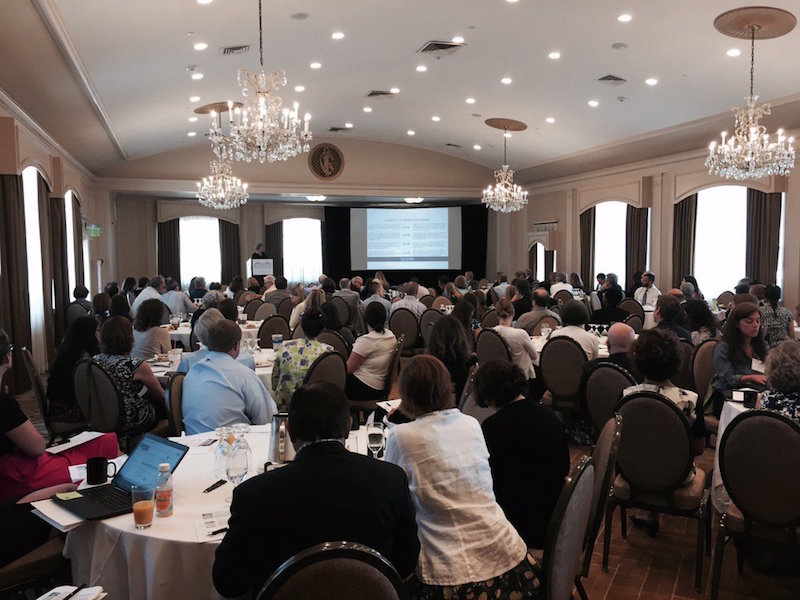The Boulder Fund grant will allow Mass Insight to pilot a new program targeting middle school readiness. May. 22, 2025 –Boston– Mass Insight Education & Research’s President and CEO, Andrea Wolfe, has been selected in the 2025 cohort of Education Leaders of...
Opening the Gates of Possibility: Recap of Rennie Center Event

On July 21 MIE had the opportunity to share its vision for a state-wide school accountability and assistance system with more than 150 nonprofit, district and state leaders at The Rennie Center’s Shaping the Future of Accountability event. The Rennie Center asked nine organizations to present a poster detailing plans with actionable strategies that adhere to state and federal regulations.
Our poster’s proposed system was based on the fact that only schools designated Level 4 or 5 are eligible to make changes and access resources for dramatic transformation. However, almost half of Level 3 schools perform as poorly as Level 4 and 5 schools and are therefore failing their students due to a scarcity of vital supports.
In 2015, 280 Massachusetts schools were labeled Level 3—121 schools, or 43%, of all Level 3 schools are in the bottom 10th percentile of schools in the state, representing more than 71,000 students. This leaves too many Level 3 schools on a trajectory to fail their students.
Our proposed system broadens the eligibility criteria for schools to collectively bargain, extends school improvement plan time, and allows schools and districts to pool resources and money into zones. Under this vision, chronically underperforming schools are given the flexibilities and support they need for sustained improvement before failing, disrupting the pipeline to chronic underperformance and allowing all students to have access to a high-quality education.

After a 30-minute poster gallery walk and remarks from Education Commissioner Mitchell Chester and Rob Curtain from the Department of Education, our CEO, Sue Lusi, was one of three organizational leaders selected to present their proposed system based on attendee votes. The two other presentations were Jonathan Rappaport of Arts|Learning who represented a collaborative team with EdVestors and MASSCreative, and two Boston Public School students who also represented a joint effort between Boston Student Advisory Council and Youth on Board. Rappaport discussed an accountability system that included measures of arts education participation. The BPS students discussed the need to expand assessment models and indicators to meet the needs of all learning styles.
The presentations sparked an important discussion about the future of accountability in Massachusetts, one that we hope continues (See all of the posters here).

Recent Posts
Cybersecurity Event Introduces Students to Cyber Careers
For the 5th year in a row, Mass Insight Education & Research is hosting the Cybersecurity and You Workshop to introduce Advanced Placement® (AP) STEM high school students to cybersecurity scenarios and concepts as well as postsecondary education and career paths....
Adolescent Literacy Crisis: IES Guide In Action – Webinar
What does the evidence say about how schools can improve the adolescent literacy crisis happening in our country? In this webinar, we explore the Institute of Education Sciences Reading Intervention Guide for Grades 4 through 9, found here, and diving into two of the...
You may also like
President and CEO of Mass Insight Named 2025 Boulder Fund Recipient by Education Leaders of Color
The Boulder Fund grant will allow Mass Insight to pilot a new program targeting middle school readiness. May. 22, 2025 –Boston– Mass Insight Education & Research’s President and CEO, Andrea Wolfe, has been selected in the 2025 cohort of Education Leaders of...
Cybersecurity Event Introduces Students to Cyber Careers
For the 5th year in a row, Mass Insight Education & Research is hosting the Cybersecurity and You Workshop to introduce Advanced Placement® (AP) STEM high school students to cybersecurity scenarios and concepts as well as postsecondary education and career paths....
All Over The Map – Webinar
When it comes to the courses high schoolers across the Commonwealth are required to complete for their diplomas, Massachusetts sets few requirements and collects no school level data. Instead, each high school makes their own determination about the courses required...


